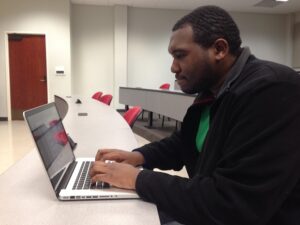Walk into almost any American college classroom these days and you will quickly find that the old-fashioned pen and paper are almost non-existent. The tools of days gone by have been increasingly replaced for students with cell phones, laptops, tablets and other digital devices.
At the same time, technology in the classroom has become an invaluable teaching aid for instructors. Whether it’s creating a class Facebook page or teaching a class entirely online, instructors can use a number of high-tech approaches to reach their students.
“I have teachers that create these elaborate PowerPoint presentations or show really relevant videos in class and it really helps,” Ole Miss senior Michael Fant said. “I grew up in the age of technology, so when you use a tool that I’m familiar with for instruction, I latch onto the material much better.”
Many students and teachers share Fant’s feelings. The disagreement often comes when the technology is in the hands of students. Many teachers feel that it is difficult, if not impossible, to keep students’ full attention when they are using electronic devices.
“I hate when my students use cell phones and computers in the classroom because they don’t pay attention to what I’m saying,” Ole Miss Spanish instructor Karla Duran said. “They are just using Facebook or something else. It’s always a distraction. Even if they start off using MySpanishLab, after five minutes they are on Facebook.”
Other instructors, including Dr. Bradley Schultz, echo Duran’s thoughts. Schultz, an Ole Miss journalism professor, uses technology as a teaching aid on a daily basis in his courses. However, he has banned students from using personal devices during his classes.
“There’s a lot of reasons,” Schultz said. “For one thing, it can impede the learning process for everyone. If it’s disruptive and someone’s wanting to pay attention and having a hard time, that’s obviously not a good thing. Secondly, it’s disrespectful for me. I’ve put a lot of work and effort into the class and I want you as the student to put as much effort into it as well.”
Many students will admit that they do more than take notes on their laptops and tablets while in class, but some argue that they are able to multi-task. However, a study published in Canada earlier this year found that students aren’t able to multi-task as successfully as they think. The study involved two groups of students, half of whom were able to use laptops during class. The researchers found that those who used the laptops performed significantly less well when quizzed on the material presented during the class.
Study data aside, the majority of students believe using their personal devices should a choice left up to them.
“Students pay for class and they pay for their laptops,” Ole Miss sophomore Alisa Wilson said. “We should be able to use them as we please. Buyer beware.”
Even Schultz says it’s tough to turn off the technology.
“It’s electronic ‘crack’,” Schultz said. “It really is. People are addicted to it.”
http://www.youtube.com/watch?v=9sySE2jOcH8&feature=youtu.be
Ole Miss students describe the impact on technology in the classroom.
Story contributed by Ole Miss journalism student Morgan White, mswhite2@go.olemiss.edu.


